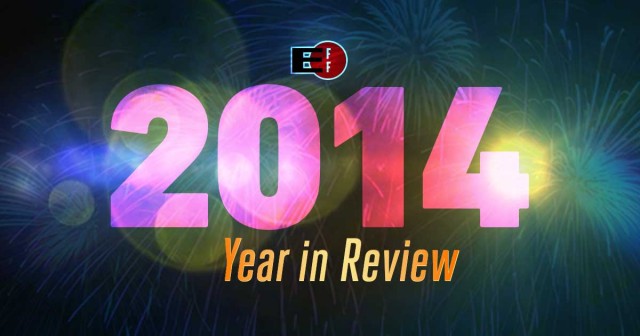 Last year, EFF took a huge step toward eliminating a highly problematic government surveillance tool—national security letters (NSLs). EFF clients won a major victory when a district court found that the NSL gag provision, which allows the government to bar recipients from speaking about NSLs without judicial review, is a prior restraint on speech in violation of the First Amendment. 2014 was a year of critical next steps and increasing attention for these often overlooked—but heavily used (and sometimes abused)—tools.
Last year, EFF took a huge step toward eliminating a highly problematic government surveillance tool—national security letters (NSLs). EFF clients won a major victory when a district court found that the NSL gag provision, which allows the government to bar recipients from speaking about NSLs without judicial review, is a prior restraint on speech in violation of the First Amendment. 2014 was a year of critical next steps and increasing attention for these often overlooked—but heavily used (and sometimes abused)—tools.
On October 8, 2014, the United States Court of Appeals for the Ninth Circuit heard oral argument in the government’s appeal of the district court’s 2013 decision. At argument, the court asked whether this gag order would bar recipients such as EFF’s clients from engaging in political debate about NSL reform. In contrast to its earlier position, the government responded to the court’s question by claiming that NSL recipients can lobby Congress, thereby implicitly acknowledging that they have received an NSL. However, after EFF pressed the government on this inconsistency, the government sent a letter to the court retracting this statement—and conceding that the gag order extends to all discussion that might indicate receipt.
The limitations on what Internet companies can say about NSLs they receive were at the heart of another important NSL development. On January 27, the Deputy Attorney General sent a letter to Google, Yahoo, Microsoft, LinkedIn, and Facebook that outlined two options for increased transparency reporting in response to actions these companies brought in the Foreign Intelligence Surveillance Court (FISC). The letter allows reporting about national security requests—including NSLs—in broad numerical bands. Neither of the options allows providers to definitively state that they have received zero NSLs.
Twitter didn’t think this was good enough. On October 7, the company sued the Department of Justice and the FBI, asking a federal court to declare it had the right to publish details about national security requests it did or didn’t receive. Although Twitter wasn’t a party to the companies’ FISC action, the government told Twitter it was bound by the terms of the Deputy Attorney General’s letter. Twitter’s complaint argues that it shouldn’t be bound by a settlement it wasn’t a party to, and asks the court to rule that NSL gag orders and judicial review procedures are unconstitutional.
Just this month, Nicholas Merrill, who ran an ISP called Calyx Internet Access, filed an action to finally dissolve the gag order tied to an NSL he received in 2004. Merrill previous challenge to NSLs resulted in a decision by the Second Circuit partially invalidating the NSL statute. But ten years later, he remains gagged about some elements of the NSL he received, even after the FBI’s investigation has been closed.
Finally, legislative reform of NSLs unfortunately wasn’t on the agenda for 2014. The USA Freedom Act, which died in the Senate on November 8, included small changes to the statutes that govern NSLs. But those changes would have amounted to little more than the status quo. The legislation improved some judicial review procedures, and ensured NSLs wouldn’t be used for bulk collection, but it wouldn’t have cured the unconstitutionality of the NSL statute.
In 2015, we’ll continue to spread awareness of NSLs and fight for accountability and oversight in the NSL process. To keep updated on what’s happening, check out our NSL timeline.
This article is part of our Year In Review series; read other articles about the fight for digital rights in 2014. Like what you’re reading? EFF is a member-supported nonprofit, powered by donations from individuals around the world. Join us today and defend free speech, privacy, and innovation.



 || Join EFF
|| Join EFFSource: Electronic Frontier Foundation (EFF) – eff.org
Support InfoStride News' Credible Journalism: Only credible journalism can guarantee a fair, accountable and transparent society, including democracy and government. It involves a lot of efforts and money. We need your support. Click here to Donate

1 Comment
More time to think things through and do things right